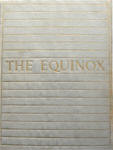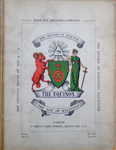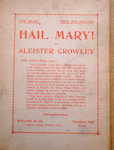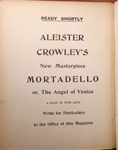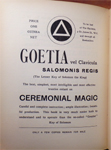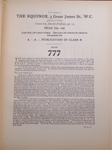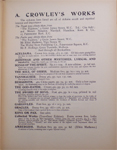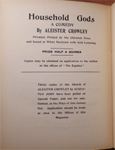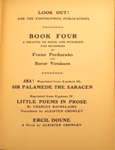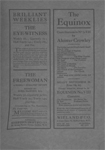100th
MP

|
THE
100th
MONKEY
PRESS |
|
|
|
Limited Editions by Aleister Crowley & Victor B. Neuburg |
|
Bibliographies |
|
Download Texts
»
Aleister
Crowley
WANTED !!NEW!!
|
|
THE EQUINOX VOLUME I, NUMBER VII |
|
Image Thumbnails |
||||||||||||||||||||||||||||||||||||||||||||||||||||||||||||||||||||||||||||||||||||||||||||||||||||||
|
Title: |
The Equinox (Volume I, Number VII). The Official Organ of the A\A\ |
|
||||||||||||||||||||||||||||||||||||||||||||||||||||||||||||||||||||||||||||||||||||||||||||||||||||
|
Variations: |
|
|||||||||||||||||||||||||||||||||||||||||||||||||||||||||||||||||||||||||||||||||||||||||||||||||||||
|
Publisher: |
||||||||||||||||||||||||||||||||||||||||||||||||||||||||||||||||||||||||||||||||||||||||||||||||||||||
|
Printer: |
Preliminaries, pages 1-248, and pages 355-400 of this volume printed by Turnbull & Spears, Edinburgh; the remainder by the Chiswick Press, London.2. |
|||||||||||||||||||||||||||||||||||||||||||||||||||||||||||||||||||||||||||||||||||||||||||||||||||||
|
Published At: |
London.1 |
|||||||||||||||||||||||||||||||||||||||||||||||||||||||||||||||||||||||||||||||||||||||||||||||||||||
|
Date: |
March 1912.1 |
|||||||||||||||||||||||||||||||||||||||||||||||||||||||||||||||||||||||||||||||||||||||||||||||||||||
|
Edition: |
1st Edition. |
|||||||||||||||||||||||||||||||||||||||||||||||||||||||||||||||||||||||||||||||||||||||||||||||||||||
|
Pages: |
xii + 424.2 |
|||||||||||||||||||||||||||||||||||||||||||||||||||||||||||||||||||||||||||||||||||||||||||||||||||||
|
Price: |
Priced at 1 guinea6 for the subscriber‘s edition and 10 shillings & sixpence2 for the regular edition. |
|||||||||||||||||||||||||||||||||||||||||||||||||||||||||||||||||||||||||||||||||||||||||||||||||||||
|
Remarks: |
Edited by Mary D'Este Sturges and Victor B. Neuburg.1 The title page is printed in black and red.2 Some of the “deluxe edition” subscription copies have a color frontispiece of the Equinox “coat of arms” design which is not present in the standard editions.4 |
|||||||||||||||||||||||||||||||||||||||||||||||||||||||||||||||||||||||||||||||||||||||||||||||||||||
|
Pagination:2 |
|
|||||||||||||||||||||||||||||||||||||||||||||||||||||||||||||||||||||||||||||||||||||||||||||||||||||
|
Contents: |
|
|||||||||||||||||||||||||||||||||||||||||||||||||||||||||||||||||||||||||||||||||||||||||||||||||||||
|
Author’s Working Versions: |
|
|||||||||||||||||||||||||||||||||||||||||||||||||||||||||||||||||||||||||||||||||||||||||||||||||||||
|
Other Known Editions: |
||||||||||||||||||||||||||||||||||||||||||||||||||||||||||||||||||||||||||||||||||||||||||||||||||||||
|
Bibliographic Sources: |
|
|||||||||||||||||||||||||||||||||||||||||||||||||||||||||||||||||||||||||||||||||||||||||||||||||||||
|
Comments by Aleister Crowley: |
“The Equinox” should have been, on its merits, a very successful venture. Frank Harris had generously given me one of the best stories he ever wrote, “The Magic Glasses”. Fuller had contributed a gargantuan preface to The Temple of Solomon the King (the title of the story of my magical career), a series of sublimely eloquent rhapsodies descriptive of the various possible attitudes towards existence. There were three important instructions in Magick; the best poem of its kind that I had so far written, “The Wizard Way”; “At the Fork of the Roads”, a true and fascinating story of one of my early magical experiences; The Soldier and the Hunchback ! and ? which I still think one of the subtlest analyses that has ever been written on ontology, with its conclusion: that ecstatic affirmation and sceptical negation are neither of them valid in themselves but are alternate terms in an infinite series, a progression which is in itself a sublime and delightful path to pursue. Disappointment arises from the fear that every joy is transient. If we accept it as such and delight to destroy our own ideals in the faith that the very act of destruction will encourage us to rebuild a nobler and loftier temple from the debris of the old, each phase of our progress will be increasingly pleasant. “pi alpha mu phi alpha gamma epsilon pi alpha gamma gamma epsilon nu epsilon tau omega rho”, “All devourer, all begetter”, is the praise of Pan. — The Confessions of Aleister Crowley. New York, NY. Hill and Wang, 1969. Page 603. ______________________________
The supplement to the first number of The Equinox is a plain reprint of my Magical Record in Paris, mentioned above. I have omitted no detail of my doings. My dinners, my dalliance and my other diversions are described as minutely as my Magick, my mantras and my meditations. Nothing of the sort had ever been published before. It is a complete demonstration of the possibility of achieving the most colossal results in conditions which had hitherto been considered an absolute bar to carrying on even elementary work. It proves my proposition that the efficacy of traditional practices is independent of dogmatic and ethical considerations; and, moreover, that my sceptical formulae based on a purely agnostic viewpoint, and on the facts of physiology and psychology, as understood by modern materialists, were entirely efficacious. In summary, let me add that The Equinox was the first serious attempt to put before the public the facts of occult science, so-called, since Blavatsky’s unscholarly hotch-poch of fact and fable, Isis Unveiled. It was the first attempt in history to treat the subject with scholarship and from the standpoint of science. No previous book of its kind can compare with it for the perfection of its poetry and prose; the dignity and sublimity of its style, and the rigidity of its rule never to make any statement which could not be proved as precisely as the mathematician exacts. I confess to being entirely proud of having inaugurated an epoch. From the moment of its appearance, it imposed its standards of sincerity, scholarship, scientific seriousness and aristocracy of all kinds, from the excellence of its English to the perfection of its printing, upon everyone with ambition to enter this field of literature. It did not command a large public, but its influence has been enormous. It is recognized as the standard publication of its kind, as encyclopedia without “equal, son, or companion”. It has been quoted, copied and imitated everywhere. Innumerable cults have been founded by charlatans on its information. Its influence has changed the whole current of thought of students all over the world. Its inveterate enemies are not only unable to ignore it, but submit themselves to its sovereignty. It was thus entirely successful from my personal point of view. I had put a pearl of great price in a shop window, whose other exhibits were pasted diamonds and bits of coloured glass for the most part, and at best, precious stones of the cheaper and commoner kind. From the moment of its appearance, everyone had to admit — for the most part with hatred and envy in their hearts — that the sun had appeared in the slum and put to shame the dips and kerosene lamps which had lighted it till then. It was no longer possible to carry on hole-in-the-corner charlatanism as heretofore. I printed only one thousand and fifty copies, the odd fifty being bound subscription copies at a guinea, and the rest in boards at five shillings. Had I sold a complete edition straight out without any discounts my return would thus have been three hundred pounds. The cost of production was nearer four hundred. Similar figures apply to the other nine numbers. In this way I satisfied myself that no one could reproach me with trying to make money out of Magick. As a matter of fact, it went utterly against the grain to take money at all. When anyone showed interest in my poetry or my magical writings, the attitude so delighted me that I felt it utterly shameful to have any kind of commercial transaction with so noble an individual, and I used, as often as not, to beg him to accept the book as a present. — The Confessions of Aleister Crowley. New York, NY. Hill and Wang, 1969. Pages 604-605. ______________________________
To return to The Equinox, there was no question of selling even that small edition even at that pitiful price. I have never had any idea of how to do business. I can make plans, both sound and brilliant; but I cannot force myself to take the necessary steps to put them into practice. My greatest weakness is that as soon as I am sure that I can attain any given object, from climbing a mountain to exploiting a beauty spot, I lose interest. The only things I complete are those of which (as for instance, poetry and Magick) I am not the real author but an instrument impelled by a mysterious power which sweeps me away in effortless enthusiasm which leaves no room for my laziness, cynicism and similar inhibiting qualities to interfere. I did try to get a few booksellers to stock The Equinox but found myself immediately up against a blank wall of what I must call Chinese conventionality. I remember hearing of an engineer in the East who wanted to built himself a house and employed a Chinese contractor. He pointed out that the work would be much easier by using bricks of a different size to that which the man was making. He obeyed, but a day later went back to the old kind. The engineer protested, but the man explained that his bricks were of a “heaven-sent” size. So I found that the format of The Equinox shocked the bookseller; worse still, it was not a book, being issued periodically, nor a magazine, being to big and well produced! I said, “What does it matter? All I ask you to do is to show it and sell it.” Quite useless. — The Confessions of Aleister Crowley. New York, NY. Hill and Wang, 1969. Pages 605-606. |
|||||||||||||||||||||||||||||||||||||||||||||||||||||||||||||||||||||||||||||||||||||||||||||||||||||
|
Reviews: |
The Equinox. Vol. I., No. 7. Wieland and Co. 10s. 6d. The different items of this Review are very diverse in character. Mr. Crowley, if he is nothing else, is at least a one-man-band. The first 100 pages are devoted to the Official Instructions of the A\A\, which I will not even pretend to understand; but if The Daily Mail says truly, as it says emphatically, that the prose rises to the level of that of the prophets of the Old Testament, they should be well worth reading. The dramatic poem, " Adonis," contains some rather clever feats of rhyming, but the poetry of it is, to my mind, marred by persistent and somewhat feeble attempts at wit and satire. The little play which follows is a cheerful story for children about a young lady who digs up an old gentleman to get his violin. This arouses the corpse, who proceeds to strangle her under romantic circumstances. It is hoped that this bright trifle will shortly enliven the gloom of the Grand Guignol. Another play, called Snowstorm, is also about a violin, or rather a violinist, who is thrown to the wolves by an injured wife, and goes blind. After various intrigues, the injured wife kills her husband by mistake, and the violinist, who wishes to make an assignation with him, plays only to his corpse. In complete change from this old-fashioned Christmassy fare comes an article entitled "A Brief Abstract of the Symbolic Representation of the Universe Derived by Doctor John Dee through the Skrying of Sir Edward Kelly." Of this I can make neither head nor tail, especially as it is illustrated with ten plates even more totally mysterious than the text. The author apologises for omitting any account of the Tables of Soyga, Liber, Logaeth, the Heptarchia Mystica, and the Book of Enoch; but I really doubt whether even these would have made things quite clear. This work of Dee and Kelly is, however, one of the most interesting chapters in history. They worked together for many years, and elaborated the most complex and incomprehensible of all the magical systems. It is not at all clear how they did it, or why they did it; and it must be remembered that Dee was one of the first scholars in England. Their work is also interesting as the first and best account of a somewhat exalted form of dealings with alleged spirits. The re-publication and analysis of these manuscripts is a task which I strongly recommend to the S.P.R. There is nothing about a violin in this article; but after this we recur to the subject, and hardly ever leave it again, except in the most important of the contents of the volume, "The Temple of Solomon the King" (continued—it began in No. I.—and though not nearly finished, makes already about 1,000 pages!). This is really interesting as detailing the circumstances under which the mysterious Society of the A\A\ manifested itself to Frater Perdurabo. A very strong case is certainly made out for the revelations; coincidence can hardly be stretched so far as to account for everything; and in the documents delivered there is certainly evidence of prophecy fulfilled in rather minute detail. In short, if miracles and prophecies were any evidence for a religion, one should find it difficult to overthrow this one. There is, in any case, at the very least, incontrovertible evidence of the workings of some supernormal intelligence possessing knowledge and power of a kind, not only of a degree, which is foreign to our experience of humanity. Mr. Crowley is best in his cheerful attacks on Mr. G. K. Chesterton and Mr. A. E. Waite. The latter article is one of the nastiest pieces of writing that I have seen for a long time. —The English Review, October 1912. ______________________________
Volume VII
Of the many periodicals just off the beaten track, "The Equinox" is certainly the most remarkable, both from the points of view of contents and format. It is a portly quarto, well printed and illustrated, and varying between three hundred and five hundred pages per number. The early numbers were published at five shillings, but owing to the increased cost of production, this price has been altered until it has reached half a guinea with the latest number. With this number also the original editor of "The Equinox," Mr. Aleister Crowley, retires, but from an announcement made in the preface, I gather that this strangely exotic personality will continue to inspire the policy of future issues. At a first glance much of the matter in "The Equinox" is quite incomprehensible to the average reader, and probably its producers would agree with me if I said it did not invite average readers to the feast of occultism set forth in each issue. The publication is described as "The official organ of the A\A\," and further, that it is "the review of scientific illuminism," and its pages blossom very often into wondrous cabalistic devices, hieroglyphics, symbols, and sentences printed in the strange and beautiful characters of Sanscrit and Hebrew. Although there is an air of mystery about many of the articles which one feels could only be understood after long training in magic and the occult, in every number there are tales and poems which all lovers of literature can appreciate. And whatever may be the ultimate aim of the promoters of "The Equinox," there is little doubt that they have succeeded in producing a periodical organ of rare distinction and merit. The current number contains, among much other interesting matter, a lithographic reproduction by Auguste Clot of the sketch portrait of Mr. Crowley, by Augustus John. —T.P.'s Weekly, 19 April 1912. ______________________________
A very mysterious volume with some mystical illustrations and elegantly made up, made its appearance at our office some time ago. It announces itself as a review published by the brothers of the A\A\ and they declare their principle in a motto on the title page as well as in the editorial introduction to be “The Method of Science—the Aim of Religion.” The book contains an account of the A\A\ by the Councillor of Eckartshausen, and we learn that the A\A\ is “the society whose members form the republic of genius, the regent mother of the whole world.” Among other contributions to this review we notice a poem entitled “The Magician” which has been translated from Eliphas Levi’s “well-known hymn.” The largest contribution is entitled “The Temple of Solomon the King” and is headed by a quotation from Prof. William James. It is surpassed in length only by “John St. John the Record of the Magical Retirement of G. H. Frater O\M\” Other smaller contributions of poetry, short essays and tales form the remaining third of the volume. Most assuredly the whole bears a very curious aspect. The Occult Review, which is more familiar with the subject and literature of “scientific illuminism” than we, writes as follows of this remarkable periodical: “The genius of this book, Mr. Aleister Crowley, seems at the first blush to be the Panurge of mysticism, and to those who have regarded with delight the amazing adventures of the brilliant Rabelaisian figure, such a modern prototype would appear in anything but an unamiable light. At all events, Mr. Crowley is at once a mystic, a sardonic mocker, an utterer of many languages, a writer of magnificent prose interspersed with passages of coarse persiflage, and also a philosopher of not a little penetration and power of analysis. The expert alone will be able to judge of the scope and meaning of the mystical doctrines and practices contained in this volume, but to the uninformed lay reader the main thesis would appear to be the necessary passage of the soul through all experience, including the depths of iniquity, in order to rise to the serene heights of balanced wisdom and superior life.” This reviewer speaks with enthusiasm of the literary style of the volume: “Though the imaginative portion is not all on the same level, it may be said that there is no one now writing in the English language who can command a greater splendor of style.” We agree with the reviewer in The Occult Review that this unusual publication “may be recommended to any one who has a spark of intellectual curiosity.” —The Open Court, August 1912. ______________________________
For purposes of review, it may be hazarded roundly that the whole of the “Equinox” is a creation of the amazing Mr. Crowley. His antics are as wild as the devil’s, he dances through its pages like a mad magician. It is a sort of enchanted variety entertainment. I must not fail however to draw attention to one of the two fine plays that happen to be written in prose. “The Ghouls” is possibly the most ghastly death-dance in English literature. If Oscar Wilde had written it (but he could not have) every one would know it. It is the very pitch and marrow of terror. Cynical it may be, indecent it may be, but I defy the lord of dreams to send any more plutonian nightmare to haunt our mortal sleep. —The Poetry Review, date unknown. ______________________________
The new number of “The Equinox” continues to keep up the tradition of the earlier numbers as to size, the mystical nature of its contents, and the unintelligibility of many of its articles. . . . —Review of Reviews, date unknown. ______________________________
Here is the weirdest muddle that one could well stumble across in this most muddled age. . . . Powerfully individualistic, descending sometimes nearly to the level of the sordid, soaring sometimes to the heights of genius, the matter could not be reviewed properly in twenty times the space that we can give it. . . . Those who are certain of their sanity and the breadth of their viewpoint should read this magazine when they get the opportunity. Theosophists will find the few references to Theosophy anything but complimentary. . . . —Theosophy in Scotland, date unknown. ______________________________
The Equinox is permanent in its stately size and type, continuous in its periodical character, permanent—in the value of its contents. —Vanity Fair, date unknown. ______________________________
Expensively printed lunacy, astrology, etc., in oriental-occidental jargon. —The Literary Guide, date unknown. ______________________________
It easily takes rank as the most vigorous swearer and blasphemous in respectable modern literature. Moreover its swearing and blasphemy are splendidly done, with immense style and glorious colouring. Its contributors certainly know how to write, though occasionally they remind one of certain efforts that have emanated from lunatic asylums where gorgeousness of imagination and riotous language are by no means unknown. But underneath all, there is a huge wealth of knowledge, a few indications of serious feeling, and a big flow of occult thought. Yet with all its “illuminism” it is so much of a mocker that we have before us the figure of a Mephistopheles. . . . The Equinox is put forth with a certain pomp, its writers are by no means negligible in competence. All we can say is that they remind us of Diakkas and Jingles, and occasionally of Colney Hatch. . . . The reference to black mass and the chaotic mixture may possibly help to explain the rumours of devil worship which were persistent not long ago. Perhaps we have here the key to that dark door. . . . —The Light, date unknown. ______________________________
A mysterious publication called “The Equinox,” the official organ of the A\ A\ has just been released upon a long-suffering world. . . . It is a sort of thing no fellow can understand. One gathers vaguely out of the confusion that it deals with such things as Magic, wizardry, mysticism, and so on; but what the special line is, remains a baffling mystery. . . . From frequent references to some people called The Brothers of the A\ A\ one gathers that they have a lot to do with this weird venture; but a grim perusal of an article purporting to explain the Order . . . leaves one without any real clue as to their identity. True, the Chief of the Brothers is definitely names, his name being “V.V.V.V.V.” but five V’s, do not strike one as a name likely to be well known at any local post office. . . . One gets all kinds of entertainments in “The Equinox” . . . Poetry gets a strong show, but it is uncomfortable reading. . . . —The Morning Leader, date unknown.
______________________________
The Equinox, Vol. I. No. VII. March 1912 (19s. 6d. net), contains between 400 and 500 pages, largely the work of Mr. Aleister Crowley. “The Ghools” is a truly haunting production, and perhaps the best thing in the volume. There is also a striking full-page sketch of Mr. Crowley by Augustus John. —The Cambridge Magazine, 19 October 1912. |
|||||||||||||||||||||||||||||||||||||||||||||||||||||||||||||||||||||||||||||||||||||||||||||||||||||
